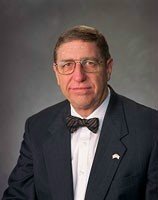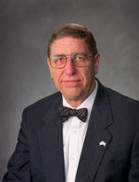Dispatch from Manhattan, New York – July 23, 2007
Alan Greenspan set the tone for the convention with an analysis of the real estate market worldwide and Michael Buckley drove home the points with two follow-up sessions that went into the specifics.
Preamble: BOMA International has fulfilled the Mission to represent real estate interests worldwide with 20 National BOMA’s (the most recent Russia) and 17,000 members. When I turned over the gavel in 1984 we had 3,500 members and about five national affiliates. In consequence the scope of real estate analysis has expanded. With this in mind, here is a brief summary of what was said:
Alan Greenspan:
The former Chairman of the US Federal Reserve concentrated his analysis on what he sees as a one-time historic shift in the history of the world. Until the end of the cold war most of the developed world was in a market economy and Russia and the developing world was under a command economy. With the end of Russian dominance the developing world is now making the shift to join the market economy with these results:
- International wage competition is holding down wages in the developed world (jobs to India) and has resulted in high productivity plus accelerated development in the developing world (the fastest development in world history by quite a margin).
- This high productivity permits unusually low interest rates and internationalization makes large companies even more resilient because they are insulated from local (read US, UK, etc) fluctuations in markets. When local markets are stagnant international companies can switch resources to places that are growing such as Asia or South America.
- As a consequence of high productivity and low interest rates money is available (lots of money) to acquire assets and real estate is an asset class that can absorb a lot of money. It is a good time to be a developer – but not so good to be an owner.
- Historically owners saw 20% returns from institutional grade commercial buildings – today that is down to 10%. Developers, on the other hand, can sell buildings for very high multiples.
- Important safety tip from Greenspan: we are about half way through the impact of internationalization and signs are starting to show that we are reaching the apex of the economic shifts. Example, once we would train international students in our universities and they struggled to stay in the developed world. Today they want to go home because their opportunities are bigger at home.
- A very significant result of this shift of talent to the developing world is that these countries do not have safety nets. Along with high growth they have high “real” saving (savings from income, not cash from tapping into appreciated real estate).
- And where do they invest the savings? In the developed world! Meaning that over time the ownership of the very large companies is shifting to “world ownership” without much allegiance to the country where they are incorporated and theoretically regulated.
- Thus, wisdom dictates caution in making decisions that assume the status quo will continue more than a few years – the world in changing very fast.
Michael Buckley drove these points home in the course of about four hours of relentless hammering on specific examples of national strategic investment in real estate - investment only able to be done in countries recently under command economies. For example, the shift of the equivalent of the entire population of Europe to the Pearl River Valley of China has resulted in China becoming the world’s workshop – made a bit easier by restricting family size and thus permitting woman to augment the mature workforce. Singapore’s very specific “purchase” of the world’s scientific talent for their laboratories is another example. Buckley taught at MIT and experienced this first hand. Promising talent would be offered what they really cared about – million dollar research budgets as well as good lifestyles if they moved to Singapore.
So where does all this take us? Greenspan managed to deliver his rather upbeat message sounding like he was at the funeral of a friend. Buckley came off like a fire inspector warning everyone to take basic precautions because a fire could happen at any time. I have seldom heard good news delivered with so many warnings.
Bottom line? This is a good time to get ready for the changes to come like the ant that is storing away food for the winter. The problem is that not enough people (read cities and universities) are taking this long view – and you need to be one of them to profit from the future and avoid the slippery slope that awaits the unprepared.


1 comment:
Thanks for this write-up on the BOMA speech. I was trying to find something like this earlier but to no avail.
Based on the comments that Greenspan made that hit the press earlier today, I did a rendition of comic I'm calling "Bernanke Panky" - in this case, spoofing Greenspan (instead of Ben Bernanke). You might like it-
Bernanke Panky: Greenspan speaks at BOMA
I'll have to drop a link to this article over on bernankepanky.com. Thanks!
Post a Comment